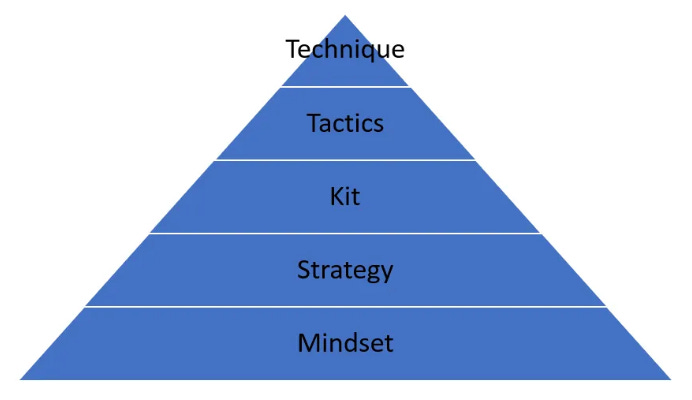New Bill; Same Problem
A Maryland bill seeking to legalize online casino gambling has been amended, but rather than removing hurdles, it makes the road more difficult.
The Bulletin Board
NEWS: Maryland’s revamped online casino bill doesn’t address core concerns.
NEWS: West Virginia’s polarizing responsible gambling bill is not as controversial as it has been made out.
LOOSE ENDS: Updates on two sports betting fraud cases; Vermont bans college player prop bets; Episode 3 of the Talking Shop Podcast.
VIEWS: Former 888 executive explains the dissolution of the 888-SI sports betting mashup.
BEYOND the HEADLINE: The difficult task of prioritizing essential things.
AROUND the WATERCOOLER: Words of wisdom from the wise.
STRAY THOUGHTS: Habits.
SPONSOR’S MESSAGE - Sporttrade was borne out of the belief that the golden age of sports betting has yet to come. Combining proprietary technology, thoughtful design, and capital markets expertise, our platform endeavors to modernize sports betting for a more equitable, responsible, and accessible future.
Learn more about what makes Sporttrade an unparalleled player experience here.
Maryland Lawmakers Overhaul Online Casino Bill
Maryland’s online casino bill (HB 1319) was already on shaky ground, and a recent amendment from the bill’s sponsor has pulled another peg out of an already unstable Jenga tower.
Per reporting by Play USA’s Matthew Kredell, Rep. Vanessa Atterbeary amended the bill in three significant ways (there are other, less consequential changes you can find in Kredell’s column):
Increased the number of available licenses from 12 to 25.
Added conditions to make licensees more diverse, equitable, and inclusive.
Prohibited the use of credit cards.
As Kredell notes, the new DEI conditions add a new layer of complexity to the licensing process:
“Maryland had a similarly complex structure for online sports betting licenses to boost diversity, equity, and inclusion.
“As a result, the state took a year and four months after bill passage to launch online sports betting. Most online gambling markets take between three-to-six months to launch.”
Further, the amendments do nothing to solve the core issues causing opposition to the bill, namely, labor concerns over cannibalization and existing industry concerns over a sky-high 55% tax rate - the credit card prohibition will give the industry more reason to balk at the bill.
Instead of eliminating hurdles, the changes add more, which isn’t ideal considering the March 18 bill crossover date and the Maryland legislature’s adjournment in early April.
Update on WV’s “Controversial” Responsible Gambling Bill
This is a follow-up to a story from earlier this week about a suddenly controversial problem gambling research bill in West Virginia.
For those who missed it, you can find the backstory here.
In a nutshell, critics claimed the amended bill was gutted and lacked teeth.
As I noted on Monday, the disagreement feels like “in-fighting over who is in charge and whose department will get the funding and money.”
I say that because the bill’s core function remained unchanged, with operators required to submit player data for research purposes. However, instead of operators individually submitting the anonymized data directly to West Virginia University, the data would be submitted to the Lottery, which would then anonymize it and send it to WVU.
On LinkedIn, Del. Shawn Fluharty wrote:
“Proud to sponsor this legislation alongside Speaker Hanshaw which will help elevate West Virginia University as an academic leader in the gaming space. Research is needed as well as preparation for students to enter the ever-growing gaming workforce. Both can and will be accomplished with this legislation. The "controversy" over this legislation is laughable at best. As I have learned through years, if the extremes on both sides of an issue aren't happy, you probably have some great legislation on your hands. I am looking forward to West Virginia University hitting the ground running. The leadership from Dean Josh Hall of the WVU John Chambers College of Business and Economics will be a catalyst in making all of this a reality.”
Time will tell what the bill does and doesn’t do, but it’s not a good look from the responsible gambling crowd to oppose a bill that provides the research everyone says they want because their specific group wasn’t invited to the party.
The issue (responsible and problem gambling) is finally getting some attention. Let’s try to keep it that way and not turn RG into yet another part of the industry that will take their ball and go home if they don’t get everything they want.
SPONSOR’S MESSAGE - SUBSCRIBE NOW to Zero Latency, the new podcast from Eilers & Krejcik Gaming that provides unparalleled insight into the U.S. online gambling industry through interviews with industry insiders and analysis from EKG experts.
Loose Ends: Sports Betting Fraud x2; VT Prohibits College Player Props; Episode 3 of the STTP Podcast
A Pennsylvania man has been indicted for running a fraudulent sports betting investment scheme. Elijah Goshert is accused of defrauding investors over five years, and “at least 10 investors lost more than $500,000,” according to a release. Goshert, who has pled not guilty, is facing three counts of wire fraud, each carrying a maximum penalty of 20 years in prison.
Amir Patel, the Jacksonville Jaguars employee who stole some $22 million from the team’s virtual credit card program, was sentenced to six-and-a-half years in prison on March 12 after pleading guilty in December. In addition to the prison sentence, Patel must repay the Jaguars $21.1 million in restitution and attend Gamblers Anonymous meetings.
The list of states updating their regulations to prohibit prop bets on college athletes is growing. Vermont’s regulations have been updated to read, “DLL NCAA restrictions: Individual player proposition (prop) bets will not be allowed on any NCAA-allowed game offered in Vermont. Proposition bets that cover the entire team will be allowed.” As mentioned previously, the prohibitions in Ohio and Maryland are just the beginning of this wave.
Listen to Episode 3 of the Talking Shop Podcast, where I’m joined by Play NJ’s David Danzis, who talks all things Atlantic City. David and I have minor disagreements over online gambling’s impact, chat about some of the wacky characters we’ve had to cover, and (unsuccessfully) try to solve the industry’s woes.
Yaniv Sherman Talks 888-SI and Betting-Media Mashups
In an illuminating LinkedIn post, former 888 executive Yaniv Sherman talked about the industry’s Holy Grail, the perfect brand/media/gaming mashup as it relates to the recently ended SI-888 sports betting partnership.
Sherman offered five points for anyone thinking about a similar tie-up to consider:
The Coke Zero Paradox: According to Sherman, companies want revenue (the taste) while keeping the gambling side (the calories) at arm’s length. As such, he cautions the betting side of the deal, “If you’re not sitting opposite the CEO (physically or by delegation), it’s not a partnership you’re negotiating. You are calories… It is incremental value to their business, but it’s all of yours.”
Sexy vs. CPA: Per Sherman, “Some brands garner awareness, some offer distribution and conversion, while others increase engagement and stickiness. They almost never present the coveted triple-threat.” He goes on to caution that a brand tie-up is meant to be a shortcut (albeit an expensive one). “If they do not translate into lower CPA/higher LTV, it means you’re probably lost (see #5).”
Don’t say Sky! Next, Sherman dove into the white whale that is Sky Bet. “It is the exception, NOT the rule, Sherman said. “It’s not to say it can’t be done… but it has to be done out of a shared strategic view and alignment of interests (see #5 again…).”
Keep your eyes on the road: Addressing the I told you so crowd, Sherman notes that every one of these partnerships is unique and contextual. “Hindsight’s only value is if you project it forward. Otherwise, it’s a post on LI (LinkedIn).”
Strategy eats Opportunity for breakfast: This is Sherman’s key point, which I’ll expand upon in the Beyond the Headline section below. Opportunities come and go. They often have real or made-up clocks ticking on them. But striking any strategic deal/partnership under the “let’s just do it and figure it out later” motto turns it into a lottery card with similar win chances.”
Beyond the Headline: My Thoughts on Success and Failure
Sherman’s thoughts overlap with something I previously wrote, the Hierarchy of Effectiveness, which is a prioritization pyramid that only includes extremely important things—but they still need to be prioritized.
For sports betting operators, the categories can be broken down as follows.
Mindset = Corporate culture, leadership, and clear long-term goals.
Strategy = The plan of attack and enough confidence to stick to the plan.
Tactics = The execution of the plan - promotions, advertising, customer service.
Technique = The details: Markets on offer, limiting/banning winners, and lines.
Kit = The product. Your platform and backend.
Here’s how I view the pyramid, with the bottom being the most important.
Sherman’s points about partnerships, leadership, and across-the-board buy-in of the plan are critical and top the list. A clear strategy is almost as crucial for a successful collaboration, which Sherman calls the folly of “let’s just do it and figure it out later.”
Essentially, both sides of a partnership of this sort need to start with a solid C-suite, clear and aligned long-term goals, and a viable strategy to achieve them.
With that massive ask in place, you can move on to how the product and brand interact with one another, the execution of the strategy, like integrating the betting product into media, and the little details, what a partner might be lacking, that help or hinder a partnership (Sexy vs. CPA).
All are important, but without the first two things in place (which is the crux of Sherman’s post), you can’t get to #3-#5.
Around the Watercooler
Social media conversations, rumors, and gossip.
Here are some words of wisdom from now-former New Jersey Division of Gaming Enforcement Director David Rebuck, relayed by Covers’ Geoff Zochodne, from the recently concluded NEXT.io conference.
On an important but currently under-the-surface issue facing the industry:
On future legalization:
On cannibalization concerns (which is the focus of tomorrow’s feature column):
Stray Thoughts
Good habits are difficult to create and easy to break.
Bad habits are easy to create and difficult to break.









